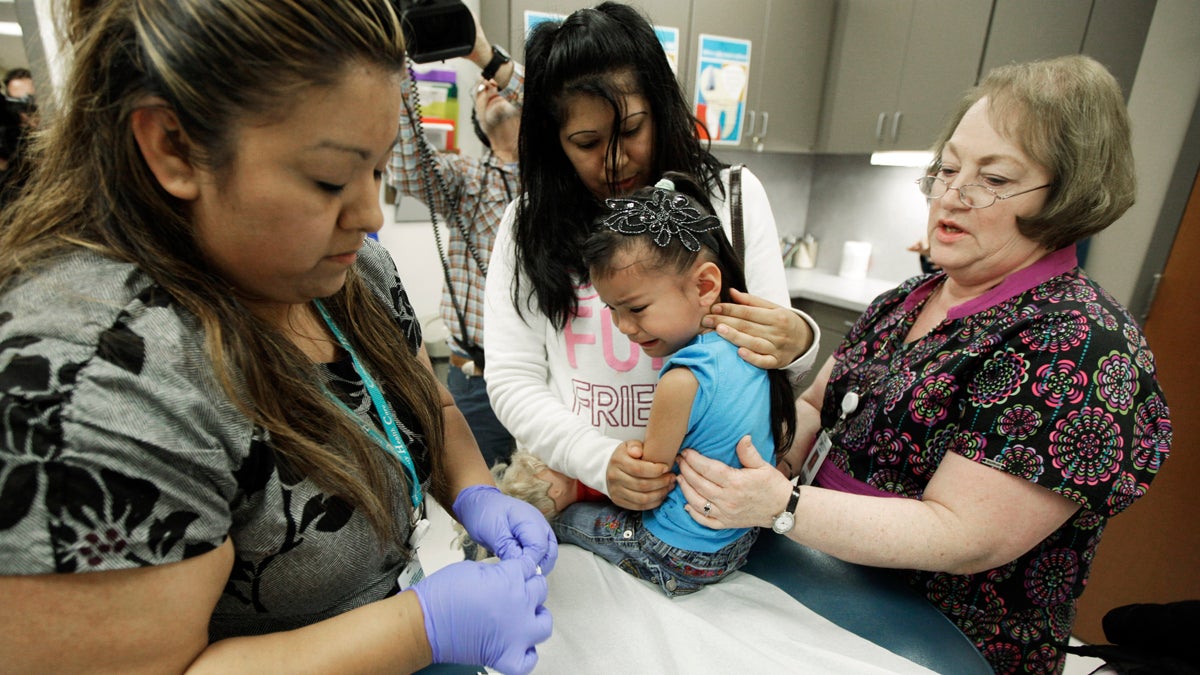Delaware sees spike in whooping cough cases

Nurses give a 4-year-old a whooping cough booster shot, as she is held by her mother at a health clinic (Ted S. Warren/AP Photo, file)
This year in Delaware, more than 200 cases of whooping cough have been reported so far — nearly four times last year’s total.
The surge is due to an outbreak that began in November and has extended to July, affecting 221 people.
While the outbreak is now over, those who contracted the disease most recently will likely be recovering for months to come.
Also known as pertussis, the bacterial infection causes respiratory illness and is most dangerous to babies and those with weakened immune systems.
A majority of cases have occurred in the Amish community, where many do not vaccinate.
Several Amish children have needed intensive care, said Karen Ravin, chief of pediatric infectious disease at Nemours/Alfred I. duPont Hospital for Children in Wilmington.
“It starts off with just what looks like a regular cold, with runny nose and mild cough,” she said. “Then it progresses to a real classic, harsh-sounding cough with a characteristic whoop in a lot of people.”
That whoop is all too familiar to Angela Carpenter of New Castle, Delaware. Her grandson Elijah came down with the disease in June, when he was just 2 months old.
“The cough started; he was on a nebulizer unit for quite some time,” she said. “Then he wouldn’t eat, he wouldn’t drink, because the cough was so severe.”
Exhausted, Elijah would collapse into sleep until the coughing woke him again. Like many infants with pertussis, he would also momentarily stop breathing and gasp for air.
The infection spread to family members, including Carpenter’s 19-year-old son, who had to be rushed to the emergency room, and Elijah’s other grandparents and great-great-grandmother, who has chronic obstructive pulmonary disease.
Months later, many of them are still coughing.
Ravin said that’s typical of whooping cough. Getting antibiotic treatment can help stop the infection from spreading to others, but it won’t do much to shorten the illness.
“In Chinese, it’s called the cough of 100 days, and that’s because you literally cough for about three months once you get pertussis,” said Ravin.
The best protection is a preventive vaccine, which comes in several varieties depending on the age of the person being immunized. Health experts recommend children get five shots of the DTaP vaccine, beginning at 2 months old. It’s suggested that adolescents and adults — especially those working with children or pregnant women — get the Tdap vaccine.
Whooping cough is known to come in natural cycles of outbreaks every three to five years.
Ravin noted that one reason for the increase in cases is that today’s vaccines are slightly less effective and may not provide immunity for as long as before. Earlier versions were more protective but also responsible for more side effects, and were discontinued in the U.S. in the 1990s.
The last whooping cough outbreak in Delaware occurred in 2004-2005, striking 345 people, primarily school-aged Amish children.
WHYY is your source for fact-based, in-depth journalism and information. As a nonprofit organization, we rely on financial support from readers like you. Please give today.
